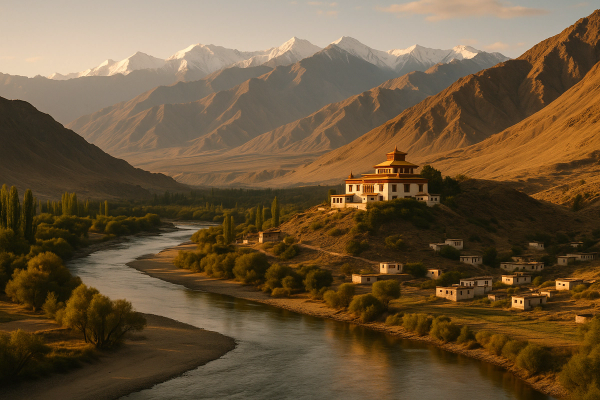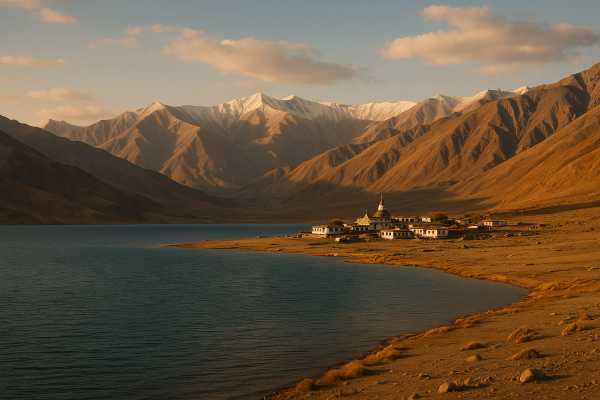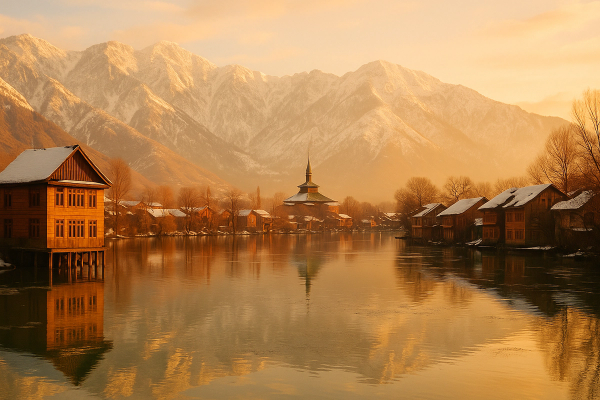Floating Dreams: Your Ultimate First-Timer's Guide to a Shikara Ride & Houseboat Stay on Dal Lake, Srinagar#
Imagine waking up to the gentle lapping of water against intricately carved wood, sunlight filtering through colourful curtains, and the distant call of a Shikara boatman gliding across a vast, shimmering lake. This isn't a fantasy; it's the reality of staying on a houseboat on Dal Lake in Srinagar, Kashmir. Couple this with the serene magic of a Shikara ride, and you have an experience that defines 'Paradise on Earth'. If you're planning your first trip, this comprehensive Dal Lake Shikara ride houseboat stay guide Srinagar is your essential companion, designed for couples, families, first-timers, and all India travelers seeking an unforgettable escape.¶
Dal Lake isn't just a body of water; it's the pulsating heart of Srinagar, a world within a world teeming with life, culture, and breathtaking beauty. It’s where vibrant floating markets bloom at dawn, majestic Mughal gardens kiss the shores, and the snow-capped Pir Panjal mountains stand sentinel in the distance. Let's dive into how you can make this dream trip a reality.¶

Srinagar & Dal Lake: A Glimpse into Paradise#
Nestled in the heart of the Kashmir Valley, Srinagar is the summer capital of Jammu and Kashmir. Often dubbed the 'Venice of the East', its lifeblood is Dal Lake, a sprawling urban lake covering roughly 18 square kilometers. But it's more than just its size; it’s a complex ecosystem of interconnected waterways, floating gardens, villages, and, of course, the iconic houseboats and Shikaras. The culture here is a rich tapestry woven from Kashmiri traditions, Mughal influences, and the rhythms of lakeside living.¶
When to Visit Dal Lake: Finding Your Perfect Season#
Srinagar experiences distinct seasons, each offering a unique charm for a Dal Lake Shikara ride and houseboat stay. Choosing the best time depends entirely on your preferences:¶
Spring (April - May): Blooming Beauty#
This is arguably one of the most magical times. The weather turns pleasant (15°C - 25°C), and the famous Tulip Garden bursts into a riot of colour (usually best in early to mid-April). The lake comes alive after winter, and the surrounding hills are lush green. It's perfect for sightseeing and comfortable Shikara rides.¶
- Pro: Stunning floral displays, pleasant weather, relatively fewer crowds than peak summer.
- Con: Tulip season is short and precise dates vary; book flights and houseboats well in advance.
Summer (June - August): Peak Season Sunshine#
Expect warm days (20°C - 30°C) and cool evenings. This is the peak tourist season, offering the full Dal Lake experience – bustling markets, long daylight hours for Shikara rides, and all attractions fully operational. The lake is vibrant and full of activity.¶
- Pro: Warmest weather, ideal for extended lake exploration, all activities available.
- Con: Peak season means higher prices and more tourists; booking is essential.
Autumn (September - October): Golden Hues#
Many consider autumn the most beautiful season. The temperature cools down (10°C - 20°C), humidity drops, and the Chinar trees lining the lake turn spectacular shades of gold, red, and orange. The skies are often clear, offering stunning mountain views. It's less crowded than summer.¶
- Pro: Breathtaking scenery, comfortable weather, fewer crowds.
- Con: Nights start getting chilly; pack accordingly.

Winter (November - March): A Different Kind of Magic#
Winter brings cold temperatures (often near or below freezing), and parts of the lake can freeze. Snowfall transforms Srinagar into a winter wonderland. While incredibly picturesque, many houseboats may lack adequate heating, and some services might be limited. Shikara rides are possible but very cold.¶
- Pro: Unique snowy landscapes, very few tourists, potential for lower prices (if operational).
- Con: Extreme cold, essential to book a well-heated houseboat, some routes/activities might be inaccessible.
Getting to Srinagar and Navigating Dal Lake#
Reaching the heart of Kashmir is relatively straightforward:¶
- By Air: Sheikh ul-Alam International Airport (SXR) in Srinagar is well-connected with major Indian cities like Delhi, Mumbai, Bengaluru, etc. Airlines like IndiGo, SpiceJet, Air India, and Vistara operate regular flights. From the airport, prepaid taxis or ride-sharing services can take you to the Dal Lake ghats (embarkation points) in about 45-60 minutes (cost approx. INR 800-1200).
- By Road: While scenic, road travel requires more time. Jammu Tawi is the nearest major railway station (approx. 250 km away). From Jammu, you can hire taxis or take buses to Srinagar (a journey of 7-9 hours via NH44). Self-driving is possible but be aware of mountain road conditions and potential security checks.
Getting Around Dal Lake: Once you reach a designated ghat (like Ghat No. 1, 5, 9, etc.), your primary mode of transport to your houseboat and around the lake itself will be the Shikara. These colourful, canopied wooden boats are the taxis and gondolas of Dal Lake.¶
Local Tip: Pre-arrange your pickup Shikara with your houseboat owner. They will usually meet you at a specific ghat to transfer you and your luggage to the houseboat. This initial transfer is often included in your stay.
Choosing Your Floating Abode: The Dal Lake Houseboat Experience#
Staying on a houseboat is the quintessential Dal Lake experience. These aren't 'boats' in the conventional sense, but stationary, ornately decorated wooden structures moored on the lake, often passed down through generations. Choosing the right one is key to your enjoyment.¶
Understanding Houseboat Categories: Budget vs. Luxury#
Houseboats generally fall into categories, often denoted by names or grades (Deluxe, Super Deluxe, Premium, Luxury). Here’s a breakdown:¶
| Category | Typical Features | Approx. Price Range (per night, double occupancy, incl. meals) | Best For |
|---|---|---|---|
| **Budget/Standard** | Basic amenities, shared living/dining areas, simpler decor, may be closer to the shore or busier areas. | INR 2,000 - 4,000 (~$25 - $50) | Backpackers, budget travelers prioritizing location over luxury. |
| **Mid-Range/Deluxe** | Comfortable rooms with attached bathrooms, better furnishings, often includes heating (check!), decent service, good locations. | INR 4,000 - 8,000 (~$50 - $100) | Families, couples seeking a balance of comfort and value. |
| **Luxury/Premium** | Spacious suites, exquisite walnut wood carving, plush furnishings, modern bathrooms with hot water, personalized service, often includes heating/AC, prime locations (quieter areas like Nagin Lake or secluded Dal Lake spots), potentially Wi-Fi. | INR 8,000 - 20,000+ (~$100 - $250+) | Honeymooners, luxury seekers, those wanting top-tier comfort and service. |
Note: Prices are highly indicative and vary significantly based on season, exact location, inclusions (meals are often included - typically breakfast and dinner), and booking platform. Always confirm inclusions before booking.¶
Tips for Choosing Your Houseboat#
- Location Matters: Dal Lake is vast. Houseboats near main ghats are convenient but can be noisy. Those further inside or on quieter Nagin Lake offer more tranquility but require longer Shikara rides.
- Read Recent Reviews: Platforms like TripAdvisor, Booking.com, or Google Reviews provide valuable insights from recent guests. Pay attention to comments on cleanliness, service, food quality, and heating (especially crucial outside summer).
- Check Amenities: Confirm essentials like 24/7 hot water, heating facilities (especially vital from October to April), included meals (MAP - breakfast & dinner is common), and Wi-Fi (often patchy).
- View Photos Carefully: Look beyond the wide-angle shots. Examine room details, bathroom conditions, and the overall upkeep.
- Book in Advance (Recommended): Especially during peak season or if you have specific requirements, booking ahead secures your choice and potentially better rates. However, some travelers prefer to see the houseboat first upon arrival, which is possible in the off-season but carries risks.
My Tip: Don't hesitate to communicate directly with the houseboat owner before booking. Ask questions about location, inclusions, and heating – their responsiveness can be a good indicator of service quality.
The Soul of Dal Lake: Experiencing the Shikara Ride#
Gliding silently across the water in a Shikara, propelled by the rhythmic paddle strokes of your Shikarawala, is pure poetry. It's the best way to truly absorb the lake's atmosphere.¶
What is a Shikara Ride Like?#
Picture a long, slender wooden boat, brightly painted, with comfortable cushioned seats set low, often covered by a canopy adorned with colourful fabrics and tassels. Your Shikarawala sits at the stern, skillfully navigating the waterways. It’s relaxing, intimate, and offers unparalleled views of life on the lake – other Shikaras, houseboats, floating shops, children going to school by boat, locals tending to floating gardens.¶
Typical Shikara Routes & Costs#
Shikara rides are usually priced based on duration or specific routes. The government fixes rates, often displayed at the ghats, but negotiation is common practice. Always agree on the price, duration, and exact route *before* starting your ride.¶
- Short Ride (1 Hour): A general tour around a section of the lake, perhaps past Nehru Park or towards Char Chinar island. Estimated Cost: INR 500 - 800 per boat (not per person).
- Floating Market Ride (Early Morning): Needs a very early start (around 5-6 AM). A unique experience seeing the wholesale vegetable market conducted entirely on boats. Requires a longer ride (approx. 2-3 hours round trip). Estimated Cost: INR 1500 - 2500.
- Sunset Ride (1-2 Hours): Hugely popular for the stunning views as the sun dips behind the mountains, painting the sky and water in fiery colours. Estimated Cost: INR 800 - 1500.
- Combined Routes: You can combine visits to Nehru Park, Char Chinar, Hazratbal Shrine (view from the lake), floating gardens, and specific market areas. Discuss your interests with the Shikarawala. A 3-4 hour comprehensive ride might cost INR 2000 - 3500.
Cost Clarity: Confirm if the agreed price is for the entire boat or per person (it's almost always per boat for up to 4 people). Reconfirm the duration clearly to avoid misunderstandings later.
Managing Vendors on the Water#
Part of the Dal Lake experience involves encounters with floating vendors in their own Shikaras, selling everything from flowers and saffron to jewellery, handicrafts, snacks, and even offering photo opportunities in traditional attire.¶
- Be Polite but Firm: If you're not interested, a simple, polite 'No, thank you' (Nahi, shukriya) usually suffices. Avoid lengthy engagement if you don't intend to buy.
- Bargaining is Expected: If you are interested in purchasing something, know that bargaining is standard practice. Offer a price significantly lower than quoted and negotiate respectfully.
- Don't Feel Pressured: Enjoy the interactions, but don't feel obligated to buy anything. Your Shikarawala might get a commission, but you are the customer.
- Photography: Some vendors offer photos in traditional Kashmiri outfits. Agree on the price beforehand if you opt for this.
Capturing the Magic: Photography Tips for Dal Lake#
Dal Lake is a photographer's dream. Here’s how to capture its essence:¶
- Golden Hours: Sunrise and sunset offer the most dramatic lighting for both houseboat stays and Shikara rides.
- Reflections: Use the calm water to capture stunning reflections of houseboats, mountains, and Shikaras.
- Details: Focus on the intricate carvings on houseboats, the colourful fabrics of Shikaras, the vibrant produce at the floating market, or the weathered hands of a Shikarawala.
- Life on the Lake: Capture candid moments – children commuting, vendors interacting, daily chores.
- Perspective: Shoot from low down in the Shikara for a unique perspective, or find higher vantage points from lakeside gardens or viewpoints.
- Ask Permission: Always ask respectfully before taking close-up photos of people.
Flavours of Kashmir: Food & Drink on Dal Lake#
Your houseboat stay often includes delicious home-cooked Kashmiri meals. Don't miss these culinary experiences:¶
- Houseboat Meals: Typically includes breakfast (often eggs, toast, parathas, tea/coffee) and dinner (a mix of vegetarian and non-vegetarian Kashmiri dishes like Rogan Josh (lamb curry), Dum Aloo (potato curry), various vegetable preparations, rice, and roti). The food is usually flavourful but not overly spicy unless requested.
- Kahwa: The traditional Kashmiri green tea infused with cardamom, cinnamon, saffron, and often almonds. It's warming and aromatic, perfect after a chilly Shikara ride. Many houseboats serve it complimentary.
- Wazwan (Elements of it): While the full multi-course Wazwan feast might be hard to arrange on a standard houseboat stay, you'll likely taste some signature dishes.
- Lake Snacks: Vendors might sell roasted corn (bhutta), lotus stem crisps (nadru chips), or other local snacks from their Shikaras.
Must-Try: Ask your houseboat cook if they can prepare Nadru Yakhni (lotus stem in yogurt gravy) or a simple Haak Saag (Kashmiri collard greens) for an authentic local taste.
Practical Tips for Your Dal Lake Adventure#
A little preparation goes a long way for a smooth trip.¶
Packing Essentials#
- Layers: Weather can change. Pack light jackets, sweaters, or shawls, even in summer, for evenings.
- Modest Clothing: Respect local culture, especially when visiting markets or areas outside the main tourist zones.
- Comfortable Footwear: For exploring Mughal gardens or walking around ghat areas.
- Sun Protection: Sunscreen, sunglasses, and a hat are essential, as the sun reflects strongly off the water.
- Rain Gear: A light raincoat or umbrella, especially outside the peak dry seasons.
- Medications: Carry any personal medications, plus basics like pain relievers and stomach remedies.
- Camera & Power Bank: You'll be taking lots of photos! Ensure your devices stay charged.
- Cash: While some places accept digital payments, cash is essential for Shikara rides, small vendors, and tips.
- Winter Specifics (Nov-Mar): Heavy woollens, thermal wear, insulated jacket, gloves, cap, warm socks, waterproof boots.
Budget Considerations#
Your daily expenses will vary based on your houseboat choice and activities. Factor in:¶
- Accommodation: INR 2,000 - 20,000+ per night (major variable).
- Shikara Rides: INR 500 - 3500 per ride, depending on duration/route.
- Food: Often included (Breakfast/Dinner). Budget extra for lunch (INR 300-800 per person) and snacks.
- Sightseeing: Entrance fees for Mughal Gardens (approx. INR 20-50 per garden).
- Shopping/Souvenirs: Highly variable.
A rough mid-range estimate could be INR 4,000 - 7,000 per person per day (excluding flights), heavily influenced by your houseboat choice.¶
Safety & Etiquette#
- Travel Advisories: Always check current government travel advisories for Jammu & Kashmir before your trip.
- Reputable Bookings: Book houseboats and tours through trusted platforms or recommendations.
- Stay Aware: Be mindful of your surroundings, especially in crowded areas.
- Respect Customs: Dress modestly, especially outside tourist hubs. Be polite in interactions.
- Bargaining: Bargain politely and with a smile. Don't undervalue craftsmanship, but don't accept the first price.
- Photography: Ask permission before photographing individuals.
Connectivity#
Mobile networks work in Srinagar, but data speeds can be variable, especially on the lake. Wi-Fi on houseboats can also be inconsistent. Only postpaid connections from other Indian states typically work in Kashmir; prepaid SIMs often don't roam here. Consider getting a local SIM if needed for a longer stay.¶
Responsible Travel on Dal Lake#
Dal Lake is a fragile ecosystem and a cherished cultural landscape. Please travel thoughtfully:¶
- Minimize Waste: Carry reusable water bottles. Dispose of all litter properly – never throw anything into the lake. Ask your houseboat owner about their waste management practices.
- Water Conservation: Be mindful of water usage on the houseboat.
- Support Local Economy: Buy handicrafts directly from artisans if possible (ensure fair prices). Hire local Shikarawalas.
- Respect Wildlife: Observe birds and aquatic life from a distance.
- Cultural Sensitivity: Engage respectfully with locals, understand their way of life depends on the lake's health and tourism.
Final Thoughts: Why a Dal Lake Houseboat Stay & Shikara Ride is Unmissable#
Experiencing Dal Lake isn't just about ticking off items on a checklist; it's about immersing yourself in a unique, floating world that moves at its own gentle pace. From the serene glide of a Shikara at sunset to the cozy charm of a traditional houseboat, it's an adventure that touches your soul. Whether you're seeking romance, family bonding, or simply a moment of peace amidst stunning natural beauty, this Dal Lake Shikara ride houseboat stay guide Srinagar aims to equip you for an unforgettable journey.¶
The blend of nature, culture, and tranquility found here is truly special. It’s a place that stays with you long after you've left its shores.¶
Have you experienced the magic of Dal Lake? Share your own tips or favorite moments in the comments below! Ready to plan your own Kashmiri adventure? Bookmark this guide or explore more India travel inspiration!¶














